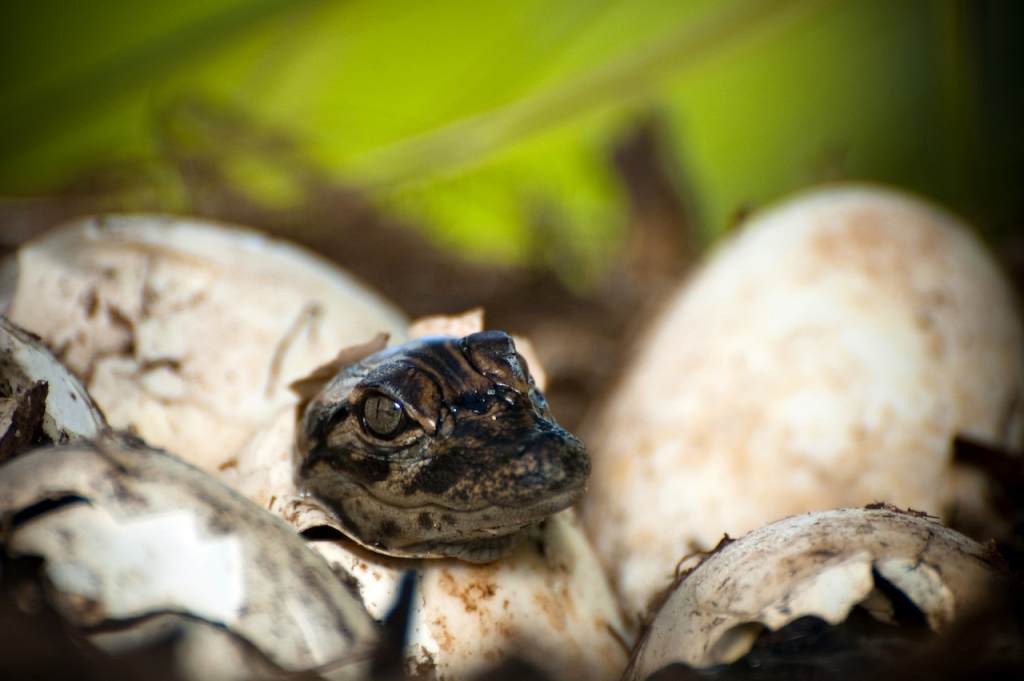Summer 2023 proved a record year for large alligators. On August 26, Mississippi announced the discovery of a massive male alligator weighing 802.5 pounds and measuring a whopping 14 feet three inches long. Then, news emerged of a second gator discovery in Central Florida in early September. This one came in at an enormous 920 pounds and a length of 13 feet 3¼ inches long.
These hefty specimens have had people questioning just how big alligators can get. And whether they stop growing at all. Here’s the skinny on how alligators grow and if they ever stop.
Indeterminate Growth and Immortality
For many years, people believed American alligators never stopped growing. The endgame? Indeterminate growth and something akin to immortality. (That is, until they died due to predation or famine.) What made people come to this conclusion? For one, the occasional behemoth recovered from the swamps and bayous of the Southeastern United States.
Of course, you don’t have to look far on the internet to find plenty of sources continuing to propagate this old wives’ tale as a quick scan of Quora forums and older news articles reveals. And in all fairness, part of the myth likely stems from confusion related to supposed crocodile growth and immortality. But even these claims have been debunked.
So, what’s the final word when it comes to gator growth? We have to turn to the latest scientific research, which reveals a more complicated story. While this narrative allows for dinosaur-sized gators, it also comes with natural limitations.
Alligator Growth Revisited
To get to the bottom of American alligator growth, researchers at the South Carolina Department of Natural Resources spent 35 years studying these remarkable creatures. The decades-long study was headed up by wildlife biologists Phil Wilkinson and Thomas Rainwater.
Their work started with the simple goal of counting local alligator populations. This included indexing alligator eggs and marking babies. As months turned into years and they noticed more and more marked alligators, the scientists decided to start capturing and monitoring their growth. From 1981 to 2015, they measured marked alligators, observing their life cycles, at the Yawkey Wildlife Refuge where the animals have remained protected from hunting for a century.

Alligator Hatchling
As they continued collecting measurements, Wilkinson and Rainwater soon discovered their data debunked the myth of indeterminate growth and immortality. Instead, they saw the same pattern. Male alligators stop growing around 25 to 30 years of age. So, what about the giants sometimes captured? These outliers grow massively in their youth yet still slow to a standstill as they age.
“The dogma for years has been that crocodilians and reptiles in general grow in length until they die. Our study shows that … adult alligators stop growing before they die.” This was supported by specimens measuring the same size 35 years after their first capture.
Amazing Alligators
What else did the researchers discover? Wilkinson and Rainwater found that female alligators can reproduce well into their 70s, laying large clutches of eggs. Wilkinson explains, “We’re seeing old animals putting out the same number of viable eggs as they did 35 years ago. I like to think of them as being like a big old oak tree — they drop acorns every so often when the weather’s right, and then one day they don’t, and that’s the end of it.”
Despite these new insights into gator reproduction, the animals are far from unlimited in their growth. Like other animals, they reach a certain age and stop. And old age eventually catches up with them, too. But they do have one fantastic trick up their sleeves. Like their much smaller lizard counterparts, alligators can regrow severed limbs. This ability is relegated to juvenile alligators. Nevertheless, it makes American alligators the largest species capable of such a feat.
Ready to learn more about the American alligator? Or its cousin, the American crocodile? Get the full scoop on these incredible reptiles by visiting Ripley’s Believe It or Not! Orlando.
By Engrid Barnett, contributor for Ripleys.com









